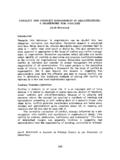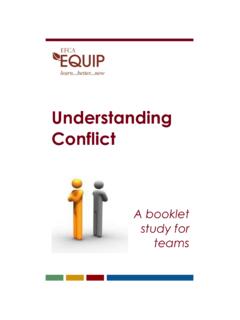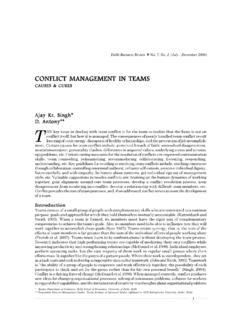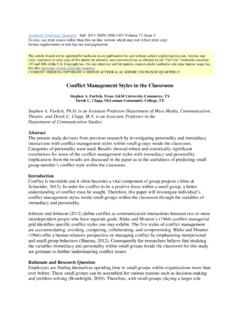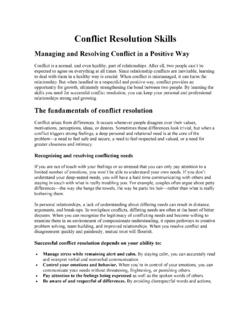Transcription of Conflict Management Training for Local Church …
1 Conflict Management Training for Local Church LeadersIn the Illinois District of the Assemblies of GodReverend Gary R. AllenABSTRACTThis project is an effort to equip Local Church leaders to better manage Conflict through anunderstanding of a biblical foundation of Conflict Management , the importance of the leader inconflict Management , and a process of Conflict first major phase of this project was to present a biblical understanding of the sourceand nature of Conflict , the importance of the Local Church as a community of faith, and a processof Conflict Management within this second phase reviewed Conflict Management literature that may be familiar to churchleaders from their workplace leadership and Management Training with an emphasis on thetransferable principles that are applicable in both the workplace and the Local the third phase of the project a Training manual was produced for the ministers andlocal Church leaders of the Illinois District of the Assemblies of God.
2 The manual described thebiblical foundation for Conflict Management , the source and nature of Conflict , the leadershipcharacteristics of the Conflict manager, Conflict Management styles, the predicable cycle ofconflict, and a process of Conflict last phase included a report of a presentation of the Training manual in a Local churchwith the results of a pre- and post-session evaluation of Conflict Management styles to measurethe growth of each participant s important goal of this project is to help district leaders, pastors, and Local churchleaders to disarm their fear of Conflict through a better understanding of Conflict and itsmanagement so they can implement and sustain their own healing findings of this project reveal that Church leaders can be trained to understand thedynamics of Conflict . They can also learn to adjust their Conflict Management styles to deal withspecific Conflict . Experienced pastors and Church leaders may need to change their thoughtpatterns.
3 What worked in the past may not work now. The challenge is for leadership to allowGod to reveal himself in the freshness of the Holy Spirit, be willing to be transformed, and bedetermined to confront destructive Conflict Strategy for Refocusing Christian Outreach Center of West Columbia, Reach the Unchurched of Columbia, , and Neighboring CommunitiesReverend Steven C. AllenABSTRACTThe purpose and scope of this project was to evaluate and refocus the ministry ofChristian Outreach Center (COC) for the purpose of reaching the unchurched. The projectexamined the effectiveness of the ministry to the core of believers, as well as reaching andassimilating the unchurched including postmoderns. The project refocused the ministry anddesigned a Church model known as the kingdom seeker model. The kingdom seeker modelwill help spirit empowered churches to become more effective in reaching the postmoderns andother unchurched kingdom seeker model demonstrates: (1) the evaluation process that will determinethe transitional steps needed; (2) how to gather data from within the organization in order tobegin the transitional process; (3) the necessary steps toward change that must be taken to effecttransition of the organization; (4) the change process that effects transition of leadership Training ,small group development, implementation of the staff coaching process, sensitizing staff andleadership to the unchurched; (5) the ongoing evaluation and realignment to the project has been tremendously effective in educating our constituency relative tocultural changes, the rise of postmodernism, and the necessity of non-compromising spirit ofempowerment.
4 Every segment of our Church operation has opened itself to reaching, loving,converting, and assimilating the unchurched into the Church body. Because of this effort, COC ismore multi-cultural and open to the lost than ever. Truly God will use COC to reach theunchurched and postmoderns of Columbia, South Carolina and neighboring Conflict in One Local Church : A Single Case-Studyof St. John s United Church of Christ Springfield, Missouri,Based on the Family Systems TheoryReverend Sol Codillo, goal of this study was threefold: (1) to show how one Local Church , such as St. John sUnited Church of Christ (UCC), can deal with inevitable changes that result in Conflict within thechurch; (2) to demonstrate how the family systems theory as applied to a congregation can aid inunderstanding Conflict ; and (3) to share the lessons learned from this study concerning understand Conflict in one particular Local Church , the project began by tracing thehistory of the Church and highlighting those significant changes that contributed to the analyzing the Conflict , several Church members were interviewed in order to gain perspectiveon how each of them interpreted and experienced the perceived Conflict .
5 The project discusseshow Conflict is understood from a biblical and secular the chapter covering the review of literature, considerable material was found dealingwith the family and the family systems theory, especially from the sociological, psychological,and anthropological point of view. It was discovered, however, that the family systems theory asapplied to churches, synagogues, and congregations, is relatively author is convinced that a Church such as St. John s UCC, which had been in denialfor many years concerning their problem of Conflict , is unable to resolve the Conflict on its takes someone, such as an understanding , responsive, and caring pastor, to bring about healingand wholeness to a conflicted congregation. Also, issues such as forgiveness, trust, love,openness, and integrity are important ingredients in resolving Church , just as a family, must go through the process or cycle of growth andmaturation. Sometimes during this process there are building blocks that can stifle growth andmaturation.
6 It is necessary that these blocks be minimized or altogether removed to avoidconflict. On the other hand, it is also important to remember that Conflict is not necessarily bador unhealthy. It is how a Church or family deals with Conflict that is indicative of health or strong and healthy Church can be an effective instrument of God s love, grace, andforgiveness in the world. The findings of this project clearly revealed that one way pastors andchurch leaders can bring understanding and resolution of Conflict within the Church is throughthe use of the family systems Leadership: A 21st Century Guidefor Senior Pastors Overseeing a Multiple StaffReverend James L. DavisABSTRACTThe project addresses the difficulties senior pastors of Assemblies of God megachurchesin the United States face in leading their staffs effectively while meeting the demands ofministry. It did this by developing a manual designed to enhance their leadership and team-building followed for the production of the manual included conducting a biblical-theological literature search to identify theological foundations for team leadership, as well as areview of current secular leadership trends.
7 Senior pastors in nine selected Assemblies of Godchurches with Sunday morning worship attendance of 1,500 or more and with 10 or more full-time pastoral staff members were surveyed for the purpose of determining their leadershipstyle(s). In addition, the pastoral staff members of these same churches were surveyed toevaluate staff team were drawn from the biblical-theological literature, leadership literature, andresponse data from the surveys for the writing of the manual. Data results from the surveys of thenine megachurches confirmed that leadership styles and principles can be learned to helpdevelop effective teamwork between senior pastors and their pastoral staffs. The manualaddresses topics designed to enhance the leadership abilities of senior pastors, helping themdevelop a total-involvement leadership style, which 89 percent of the pastors surveyed for thestudy demonstrated as the most effective style of Revitalization in the Northern Missouri District of theAssemblies of God: A Training Seminar for PastorsReverend Gary A.
8 DenbowABSTRACTF orty-eight of the ninety-five churches in the Northern Missouri District of theAssemblies of God functioning at the beginning of 2000 were plateaued or declining inattendance and active membership. Of these churches, 70 percent are below one hundred inaverage attendance, and 28 percent will have lost enough members to be closed or barelysurviving by 2010. Understandably, some of those churches are in small towns and rural areaswith a declining population. No amount of Church revitalization work will bring the populationback that has been lost from their district leadership has recognized, however, that for churches that are in viablelocations and good social circumstances to survive and be healthy, there must be able, trained,and motivated leaders. The goals of this project were to: (1) research and report districtattendance statistics for the years 1990-1999, (2) survey the district s ministers to discern theirfelt needs in the various aspects of Church leadership and personal development, (3) do researchto discover the biblical characteristics of a healthy Church , (4) discern the biblical responsibilityof Church leaders in keeping churches healthy, and (5) delineate methods and means to begin theprocess of teaching pastors of churches that need revitalization how to be empowering an initial step in the process of teaching those pastors to lead their churches torevitalization, a four-hour seminar was developed.
9 The Pastor as an Empowering Leader, waspresented in each of the district s six sections. Sixty-one percent of the senior pastors in thedistrict attended one of the presentations. Twenty-seven pastors of the forty-eight declining andplateaued churches participated in the in the seminar presentations were asked to evaluate the presenter and thecontent of the seminar. Professional educators also evaluated four of the six presentations of theseminar. The evaluations indicated that the seminar presentations were well-received andgenerally considered effective in helping many district churches and Church leaders to start theimportant process of bringing new life to churches across Northern the Unchurched in Your Community:A Module of Study Taught at Southwestern Assemblies of God UniversityReverend Jim L. McCorkleABSTRACTIn the twenty-first century, pastoral ministry graduates will face serious challenges asthey seek to minister in America s postmodern, post-Christian culture.
10 Will these pastors be ableto recognize postmodernism? What understanding will they have of generational theory ( ,Builders, Boomers, and Busters)? What resources will they be prepared to access that could helpthem analyze and understand their community s context? Will such pastors know how toevaluate and even re-design Local churches for ministry to the unchurched of the twenty-firstcentury? Training is needed that will equip them for these project presents research regarding what is becoming the prevailing mind set in thetwenty-first century Western world postmodemism with its tenets of deconstruction,centerlessness, and the absence of absolute truth. It positions the matrix of postmodernism as anoverlay to a study of current Western thought regarding generational theory. Particular emphasisis placed on the impact of postmodernism upon Busters (Generation X) who are presented as thefirst truly postmodern understanding of the significant paradigm shift that is in progress in the Westernworld raises the following question: How is the twenty-first century Church to respond to thesechallenges?





